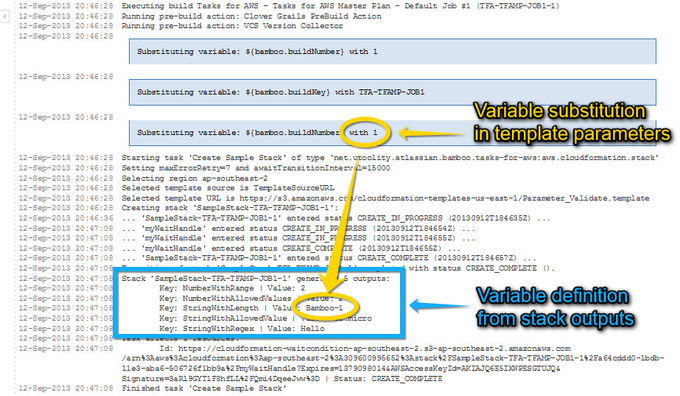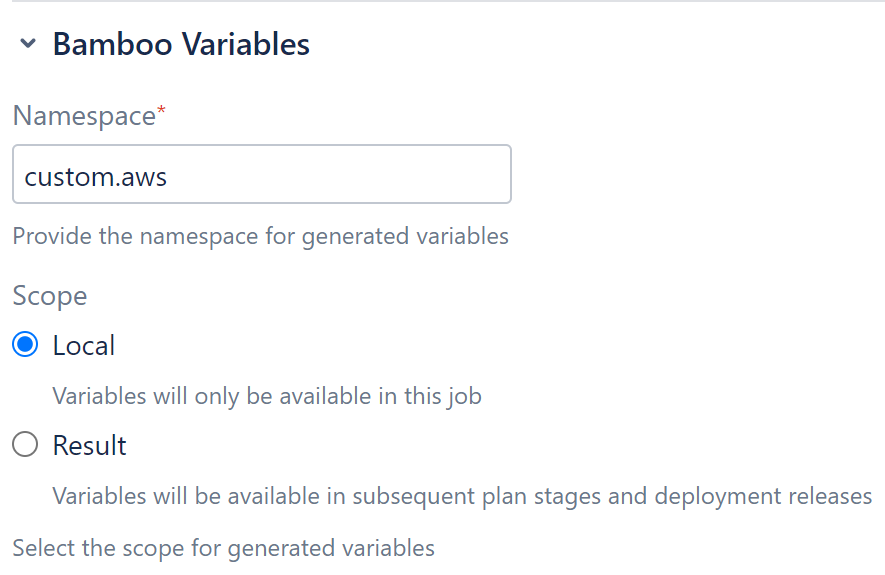...
| width | 64% |
|---|
...
All Tasks support Bamboo variables, both substituting them within parameters for AWS resource management and defining them from created AWS resources.
| Column | ||||||
|---|---|---|---|---|---|---|
| ||||||
|
...
Variable substitution
Variables are substituted in all
...
task configuration text fields (e.g. Stack Name, Template URL, Instance ID, Volume ID etc.).
...
| Tip |
|---|
Configuration as codeConfiguration as code is not yet natively supported in Bamboo. You can partially work around this limitation as outlined in How to provide task configuration from an external source like a file. |
| Note |
|---|
Sensitive data maskingTasks may emit sensitive data like credentials which are not supposed to surface in build logs - this can be achieved as follows:
|
...
|
Variable
...
definition
Variables are defined by
...
most tasks for reuse in subsequent
...
tasks, see Bamboo Variable Substitution/Definition for details, and each task's documentation for example log outputs.
 A task's generated variables might get amended with respective AWS API additions over time - a live build log will always provide the most current variable shape accordingly.
A task's generated variables might get amended with respective AWS API additions over time - a live build log will always provide the most current variable shape accordingly.We are contemplating to evolve the current key/value based approach to one based on hierarchical JSON payloads, please watch/vote/comment on the following issue to guide our resp. roadmap:
Jira Legacy server System JIRA serverId fac61c2e-db0a-39da-bb3c-e0dc0ef556f0 key UAA-92
Variable namespace and scope
As of release 2.21.0, you can now specify the namespace and scope for Bamboo variables generated by all applicable AWS tasks (this is similar to the Inject Bamboo variables task that has been included with Bamboo as of release 6.7):
You can now pass a variable between stages, pass a variable from a plan to a deployment project, and you can use multiple tasks within the same job without overriding variables from preceding tasks by adjusting the namespace. The tasks default to the preceding behavior with local scope and a custom.aws namespace so that this remains an opt-in choice for advanced use cases.
Example
This example illustrates the variable generation pattern:
variables have a dedicated prefix
...
like
bamboo.custom.aws.*,
...
with
*
...
being a task specific prefix, e.g.
bamboo.custom.aws.
...
cloudformation.stackvariables
...
referring to a collection of resources provide their ids in a semicolon separated list (i.e. the same format available on input), e.g.
${bamboo.custom.aws.ec2.
...
instance.resources}
...
with values
i-a316b842;i-b4210842 (line 2)you can refer to these variables from subsequent tasks via something
...
like
${bamboo.custom.aws.
...
| Info | ||
|---|---|---|
| ||
|
Available Task Variables
The following variables are available in the various tasks:
AWS CloudFormation Stack
...
ec2.instance.resources.i-a316b842.PrivateDnsName} (line 6)- however, given script access to such a named resource is difficult, there is a shortcut to ease reusing the first (and often only) affected resource via something like${bamboo.custom.aws.ec2.instance.first.i-a316b842.PrivateDnsName} (line 19):Code Block language text Creating common variables for 2 resources affected by task: ... bamboo.custom.aws.
...
ec2.
...
instance.resources
...
: i-a316b842;i-b4210842 Creating resource variables for instance 'i-a316b842': ... bamboo.custom.aws.
...
ec2.
...
instance.resources.
...
i-
...
- properties converted to variables: StackName, StackStatus, CreationTime, LastUpdatedTime
- collection converted to variables: tags, parameters, resources, outputs
...
a316b842.InstanceId: i-a316b842 ... bamboo.custom.aws.
...
ec2.
...
instance.resources.
...
i-
...
a316b842.State: running ...
...
bamboo.custom.aws.
...
ec2.
...
instance.resources
...
.i-a316b842.PrivateDnsName: ip-10-0-0-241.ec2.internal ... bamboo.custom.aws.
...
ec2.
...
instance.resources.
...
i-
...
a316b842.PrivateIpAddress: 10.0.0.241 ... bamboo.custom.aws.
...
ec2.
...
instance.resources.
...
i-
...
a316b842.
...
PublicDnsName: ... bamboo.custom.aws.
...
ec2.
...
instance.resources.
...
i-a316b842.PublicIpAddress: null ... bamboo.custom.aws.
...
ec2.instance.resources.i-
...
- properties converted to variables: ResourceStatus, LogicalResourceId, PhysicalResourceId, Timestamp
...
a316b842.LaunchTime: 20150716T080402Z ... bamboo.custom.aws.ec2.
...
instance.
...
resources.i-
...
| title | Legacy Variable Naming |
|---|
CloudFormation Variables had been named inconsistently in previous versions of this add-on - the following names are deprecated, but remain available for compatibility reasons for the time being:
...
a316b842.tags: Name ... bamboo.custom.aws.
...
ec2.
...
instance.resources
...
.i-
...
a316b842.tags.Name: taws-it-2.0.0 Creating resource variables for instance 'i-b4210842': ... <skipped> Creating common variables for first resource affected by task: Creating resource variables for instance 'i-a316b842': ... bamboo.custom.aws.
...
ec2.instance.
...
first.
...
InstanceId: i-a316b842 ... bamboo.custom.aws.
...
ec2.
...
instance.first.State: running ... bamboo.custom.aws.
...
ec2.instance.
...
- Note: The variables with legacy naming without prefix remain available for compatibility (e.g.
bamboo.StringWithRegex=Hello)
AWS Elastic Beanstalk Environment
...
first.PrivateDnsName: ip-10-0-0-241.ec2.internal ... bamboo.custom.aws.
...
ec2.
...
relevant resource values for each affected environment, e.g. custom.aws.cloudformation.stack.resources.=CREATE_COMPLETESampleStack-42.StackStatus
- properties converted to variables: EnvironmentId, ApplicationName, CNAME, DateCreated, DateUpdated, Description, EndpointURL, EnvironmentName, Health, SolutionStackName, Status, TemplateName, VersionLabel
Amazon EC2 Instance
...
instance.first.PrivateIpAddress: 10.0.0.241 ... bamboo.custom.aws.ec2.instance
...
.first.PublicDnsName: ... bamboo.custom.aws.ec2.
...
- properties converted to variables: InstanceId, State, PrivateDnsName, PrivateIpAddress, PublicDnsName, PublicIpAddress, LaunchTime
- collection converted to variables: tags
Amazon EC2 Image
...
instance.first.PublicIpAddress: null ... bamboo.custom.aws.ec2
...
.instance.first.LaunchTime: 20150716T080402Z ... bamboo.custom.aws.ec2.
...
instance.
...
- properties converted to variables: ImageId, State
- collection converted to variables: tags
Amazon EBS Snapshots
...
first.tags: Name ... bamboo.custom.aws.ec2.
...
instance.first.tags.Name: taws-it-2.0.0 variables are also available as environment variables in the Script task for example, albeit named slightly different, e.g.
variables are also available as environment variables in the Script task for example, albeit named slightly different, e.g.
...
$bamboo_custom_aws_cfn_stack_StringWithRegex(Unix) or%bamboo_custom_aws_cfn_stack_StringWithRegex%(Windows) variables are locally scoped and thus only reusable in subsequent tasks and not in other jobs/stages due to the implied concurrency, see the following discussion and workaround
variables are locally scoped and thus only reusable in subsequent tasks and not in other jobs/stages due to the implied concurrency, see the following discussion and workaround
Contextual entity variables
| Insert excerpt | ||||||
|---|---|---|---|---|---|---|
|
Refer to Injecting contextual entity variables into task configurations for details.

